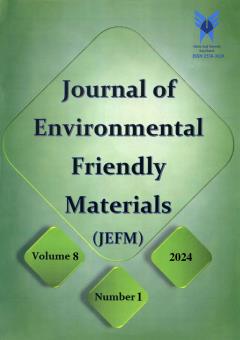Evaluation and Prediction of W/C Ratio vs. Compressive Concrete Strength Using A.I and M.L Based on Random Forest Algorithm Approach
محورهای موضوعی : Journal of Environmental Friendly Materials
1 - Department of Civil Engineering, Karaj Branch, Islamic Azad University, Karaj, Iran.
کلید واژه: Concrete, AI, Machine Learning, W/C Ratio, Prediction, Strength,
چکیده مقاله :
Concrete, an artificial stone composed of cement, aggregate, water, and additives, is extensively utilized in contemporary civil projects. A pivotal characteristic of concrete is its capacity to efficiently serve various purposes and structural requirements. Cement, water, aggregate, and additives are pivotal parameters wherein even minor alterations can significantly impact concrete strength. Among these parameters, the Water/Cement (W/C) ratio holds particular significance due to its inverse correlation with strength. Traditionally, predicting concrete strength solely based on the water-to-cement ratio has been challenging. However, with advancements in AI and machine learning techniques coupled with ample data availability, accurate strength prediction is achievable. This paper presents an analysis of a diverse dataset comprising various concrete tests utilizing machine learning methodologies, followed by a comparative examination of the outcomes. Furthermore, this study scrutinizes a renowned dataset encompassing 1030 experiments, featuring diverse combinations of cement, water, aggregate, etc., employing artificial intelligence and machine learning techniques. Model accuracy and result fidelity are evaluated through rigorous sampling methodologies. Initially, the dataset is subjected to analysis utilizing the linear regression algorithm, followed by validation employing the random forest algorithm. The random forest algorithm is employed to predict the water-to-cement ratio and corresponding compressive strength for concrete with a density of 300 kg/m3. Notably, the obtained results exhibit a high level of concordance with experimental and laboratory findings from prior studies. Hence, the efficacy of the random forest algorithm in concrete strength prediction is established, offering promising prospects for future applications in this domain.
Concrete, an artificial stone composed of cement, aggregate, water, and additives, is extensively utilized in contemporary civil projects. A pivotal characteristic of concrete is its capacity to efficiently serve various purposes and structural requirements. Cement, water, aggregate, and additives are pivotal parameters wherein even minor alterations can significantly impact concrete strength. Among these parameters, the Water/Cement (W/C) ratio holds particular significance due to its inverse correlation with strength. Traditionally, predicting concrete strength solely based on the water-to-cement ratio has been challenging. However, with advancements in AI and machine learning techniques coupled with ample data availability, accurate strength prediction is achievable. This paper presents an analysis of a diverse dataset comprising various concrete tests utilizing machine learning methodologies, followed by a comparative examination of the outcomes. Furthermore, this study scrutinizes a renowned dataset encompassing 1030 experiments, featuring diverse combinations of cement, water, aggregate, etc., employing artificial intelligence and machine learning techniques. Model accuracy and result fidelity are evaluated through rigorous sampling methodologies. Initially, the dataset is subjected to analysis utilizing the linear regression algorithm, followed by validation employing the random forest algorithm. The random forest algorithm is employed to predict the water-to-cement ratio and corresponding compressive strength for concrete with a density of 300 kg/m3. Notably, the obtained results exhibit a high level of concordance with experimental and laboratory findings from prior studies. Hence, the efficacy of the random forest algorithm in concrete strength prediction is established, offering promising prospects for future applications in this domain.
[1] Sun H, Amin MN, Qadir MT, Arifeen SU, Iftikhar B, Althoey F. Investigating the effectiveness of carbon nanotubes for the compressive strength of concrete using AI-aided tools. Case Stud. Constr. Mater. 2024; 1(20):e03083.
[2] Liu Q, Tang H, Chi L, Chen K, Zhang L, Lu C. Evolution of electrochemical impedance spectra characteristics of cementitious materials after capturing carbon dioxide. Sustainability. 2023;15(3):2460.
[3] Park J, Song H, Choi H. Estimation of water-to-cement ratio in cementitious materials using electrochemical impedance spectroscopy and artificial neural networks. Construction and Building Materials. 2022; 3(350):128843.
[4] Zhou G, Moayedi H, Foong LK. Teaching–learning-based metaheuristic scheme for modifying neural computing in appraising energy performance of building. Eng. with Computers. 2021; 37:3037-48.
[5]. Li A, Soltangharaei V, Ziehl P. Evaluation of ASR in concrete using acoustic emission and deep learning. Nucl. Eng. Des. 2021; 380:111328
[6]. Song H, Ahmad A, Farooq F, Aslam F. Predicting the compressive strength of concrete with fly ash admixture using machine learning algorithms. Constr. Build. Mater. 2021; 308:125021
[7]. Pham AD, Ngo NT, Nguyen QT, Truong NS. Hybrid machine learning for predicting strength of sustainable concrete. Soft Computing. 2020; 24(19):14965-80.
[8] Naser MZ. AI-based cognitive framework for evaluating response of concrete structures in extreme conditions. Engineering Applications of Artificial Intelligence. 2019; 1(81):437-449.
[9] Ai L, Soltangharaei V, Ziehl P. Evaluation of ASR in concrete using acoustic emission and deep learning. Nuclear Engineering and Design. 2021; 15(380):111328.
[10] jiao F, Jinxin J, Jichao G, Wang ZH. Study on the Concrete in Chloride Environment Based on Electrochemical Impedance Spectroscopy. Int. J. Pattern Recognit. Artif. Intell. 2019; 34(6):2059017.
[11] Yang L, Qi C, Lin X, Li J, Dong X. Prediction of dynamic increase factor for steel fibre reinforced concrete using a hybrid artificial intelligence model. Eng. Struct. 2019; 15(189):309-18.
[12] Cook R, Lapeyre J, Ma H, Kumar A. Prediction of compressive strength of concrete: critical comparison of performance of a hybrid machine learning model with standalone models. J. Mater. Civ. Eng. 2019; 31(11):04019255.


